Open Messaging Interface (O-MI), an Open Group Internet of Things (IoT) Standard – O-MI and XML Schema
All O-MI messages (both requests and responses) have an outermost element named “omiEnvelope”. The omiEnvelope defines the version of the O-MI used and the TTL of the message.
The rest of this appendix has been generated from the XML schema “omi.xsd”. The code generation options “Attributes” and “Source code” have been omitted.
Schema omi.xsd
Schema Location: |
C:\Users\kary\OpenGroup\Open Messaging Interface\omi.xsd |
attributeFormDefault: |
Unqualified |
elementFormDefault: |
Qualified |
targetNamespace: |
omi.xsd |
Elements |
Complex Types |
Simple Types |
msg |
cancelRequest |
schemaID |
omiEnvelope |
idType |
|
|
nodesType |
|
|
readRequest |
|
|
requestBaseType |
|
|
requestResultType |
|
|
responseListType |
|
|
returnType |
|
|
writeRequest |
|
element msg

Diagram for element msg
namespace |
omi.xsd |
used by |
complexTypes: requestBaseType requestResultType |
element omiEnvelope
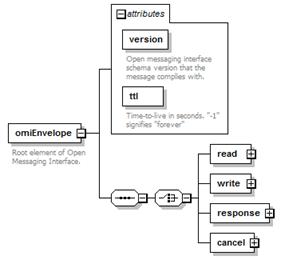
Diagram for element omiEnvelope
namespace |
omi.xsd |
properties |
content: complex |
children |
read write response cancel |
used by |
complexType: requestResultType |
annotation |
documentation: Root element of Open Messaging Interface |
attribute omiEnvelope/@version
type |
restriction of xs:string |
properties |
use: required |
annotation |
documentation: Open Messaging Interface schema version that the message complies with |
attribute omiEnvelope/@ttl
type |
restriction of xs:double |
properties |
use: required |
facets |
kind: minInclusive value: –1 annotation: –1 |
annotation |
documentation: Time-to-live in seconds. “–1” signifies “forever”. |
element omiEnvelope/read
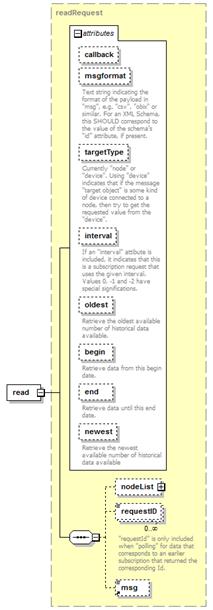
Diagram for element omiEnvelope/read
namespace |
omi.xsd |
type |
readRequest |
properties |
content: complex |
children |
nodeList requestID msg |
element omiEnvelope/write
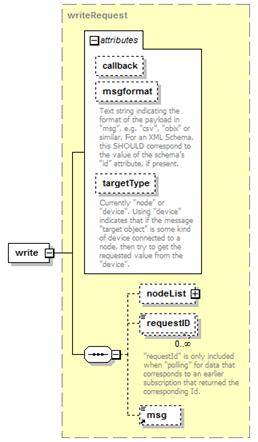
Diagram for element omiEnvelope/write
namespace |
omi.xsd |
type |
writeRequest |
properties |
content: complex |
children |
nodeList requestID msg |
element omiEnvelope/response

Diagram for element omiEnvelope/response
namespace |
omi.xsd |
type |
responseListType |
properties |
content: complex |
children |
result |
element omiEnvelope/cancel
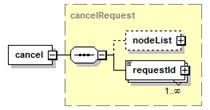
Diagram for element omiEnvelope/cancel
namespace |
omi.xsd |
type |
cancelRequest |
properties |
content: complex |
children |
nodeList requestID |
complexType cancelRequest

Diagram for complexType cancelRequest
namespace |
omi.xsd |
children |
nodeList requestID |
used by |
element: omiEnvelope/cancel |
annotation |
documentation: Cancel request type. |
element cancelRequest/nodeList
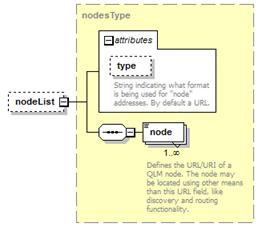
Diagram for element cancelRequest/nodeList
namespace |
omi.xsd |
type |
nodesType |
facets |
minOcc: 0 maxOcc: 1 content: complex |
children |
node |
element cancelRequest/requested
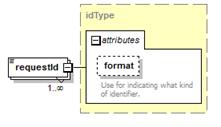
Diagram for element cancelRequest/requested
namespace |
omi.xsd |
type |
idType |
properties |
minOcc: 1 maxOcc: unbounded content: complex |
complexType idType

Diagram for complexType idType
namespace |
omi.xsd |
type |
extension of xs:string |
properties |
Base: xs:string |
used by |
Elements: requestResultType/requestID cancelRequest/requestID |
annotation |
Documentation: Some kind of identifier with optional “format” attribute for indicating what kind of identifier is used. |
attribute idType/@format
type |
xs:string |
properties |
use: optional |
annotation |
documentation: Use for indicating what kind of identifier. |
complexType nodesType
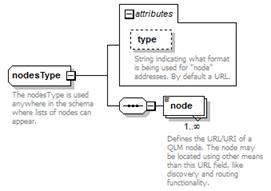
Diagram for complexType nodesType
namespace |
omi.xsd |
children |
node |
used by |
elements: requestBaseType/nodeList requestResultType/nodeList cancelRequest/nodeList |
annotation |
documentation: The nodesType is used anywhere in the schema where lists of nodes can appear. |
attribute nodesType/@type
type |
xs:string |
properties |
use: optional |
annotation |
documentation: String indicating what format is being used for “node” addresses. By default a URL. |
element nodesType/node

Diagram for element nodesType/node
namespace |
omi.xsd |
type |
xs:anyURI |
properties |
minOcc: 1 maxOcc: unbounded content: simple |
annotation |
documentation: Defines the URL/URI of an O-MI node. The node may be located using other means than this URL field, like discovery and routing functionality. |
complexType readRequest
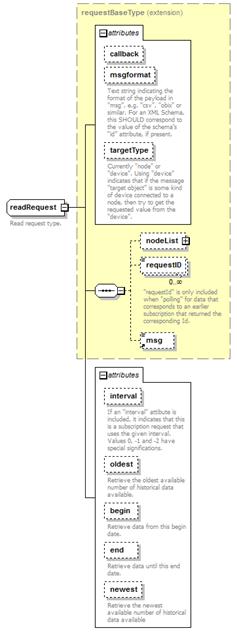
Diagram for complexType readRequest
namespace |
omi.xsd |
type |
extension of requestBaseType |
properties |
base: requestBaseType |
children |
nodeList requestID msg |
used by |
element: omiEnvelope/read |
annotation |
documentation: Read request type. |
attribute readRequest/@interval
type |
restriction of xs:double |
properties |
use: optional |
facets |
kind: minInclusive value: –2 annotation |
annotation |
documentation: If an “interval” attribute is included, it indicates that this is a subscription request that uses the given interval. Values 0, –1, and –2 have special significance. |
attribute readRequest/@oldest
type |
restriction of xs:int |
properties |
use: optional |
facets |
kind: minInclusive value: 1 annotation |
annotation |
documentation: Retrieve the oldest available number of historical data available. |
attribute readRequest/@begin
type |
xs:dateTime |
properties |
use: optional |
annotation |
documentation: Retrieve data from this begin date. |
attribute readRequest/@end
type |
xs:dateTime |
properties |
use: optional |
annotation |
documentation: Retrieve data until this end date. |
attribute readRequest/@newest
type |
restriction of xs:int |
properties |
use: optional |
facets |
kind: minInclusive value: 1 annotation |
annotation |
documentation: Retrieve the newest available number of historical data available. |
complexType requestBaseType
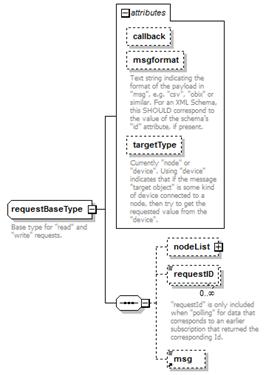
Diagram for complexType requestBaseType
namespace |
omi.xsd |
children |
nodeList requestID msg |
used by |
complexTypes: readRequest writeRequest |
annotation |
documentation: Base type for “read” and “write” requests. |
attribute requestBaseType/@callback
type |
xs:anyURI |
properties |
use: optional |
attribute requestBaseType/@msgformat
type |
schemaID |
properties |
use: optional |
annotation |
documentation: Text string indicating the format of the payload in “msg”; e.g., “csv”, “obix”, or similar. For an XML schema, this SHOULD correspond to the value of the schema’s “id” attribute, if present. |
attribute requestBaseType/@targetType
type |
restriction of xs:string |
properties |
use: optional |
default: node |
|
facets |
kind: enumeration enumeration value: device node annotation |
annotation |
documentation: Currently “node” or “device”. Using “device” indicates that if the message “target object” is some kind of device connected to a node, then try to get the requested value from the “device”. |
element requestBaseType/nodeList
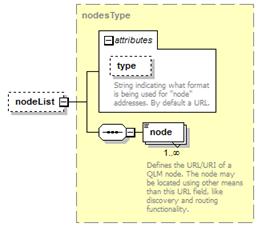
Diagram for element requestBaseType/nodeList
namespace |
omi.xsd |
type |
nodesType |
properties |
minOcc: 0 maxOcc: 1 content: complex |
children |
node |
element requestBaseType/requested

Diagram for element requestBaseType/requested
namespace |
omi.xsd |
properties |
minOcc: 0 maxOcc: unbounded |
annotation |
documentation: “requested” is only included when “polling” for data that corresponds to an earlier subscription that returned the corresponding ID. |
complexType requestResultType
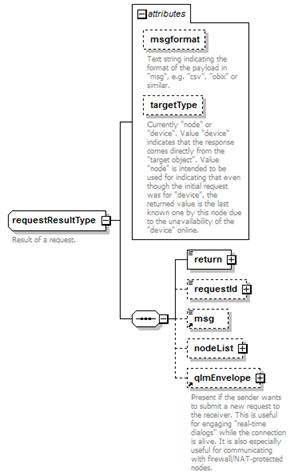
Diagram for complexType requestResultType
namespace |
omi.xsd |
children |
return requestID msg nodeList omiEnvelope |
used by |
element: responseListType/result |
annotation |
documentation: Result of a request. |
attribute requestResultType/@msgformat
type |
schemaID |
properties |
use: optional |
annotation |
documentation: Text string indicating the format of the payload in “msg”; e.g., “csv”, “obix”, or similar. |
attribute requestResultType/@targetType
type |
restriction of xs:string |
properties |
use: optional default: node |
facets |
kind: enumeration enumeration value: device node annotation |
annotation |
documentation: Currently “node” or “device”. Value “device” indicates that the response comes directly from the “target object”. Value “node” is intended to be used for indicating that even though the initial request was for “device”, the returned value is the last known one by this node due to the unavailability of the “device” online. |
element requestResultType/return
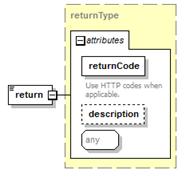
Diagram for element requestResultType/return
namespace |
omi.xsd |
type |
returnType |
properties |
content: complex |
element requestResultType/requested
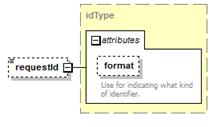
Diagram for element requestResultType/requested
namespace |
omi.xsd |
type |
idType |
properties |
minOcc: 0 maxOcc: 1 content: complex |
element requestResultType/nodeList
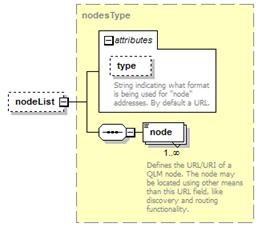
Diagram for element requestResultType/nodeList
namespace |
omi.xsd |
type |
nodesType |
properties |
minOcc: 0 maxOcc: 1 content: complex |
children |
node |
complexType responseListType

Diagram for complexType responseListType
namespace |
omi.xsd |
children |
result |
used by |
element: omiEnvelope/response |
annotation |
documentation: List of results. |
element responseListType/result
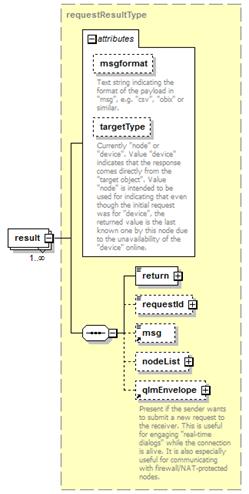
Diagram for element responseListType/result
namespace |
omi.xsd |
type |
requestResultType |
properties |
minOcc: 1 maxOcc: unbounded content: complex |
children |
return requestID msg nodeList omiEnvelope |
complexType returnType
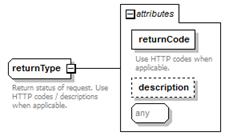
Diagram for complexType returnType
namespace |
omi.xsd |
type |
extension of xs:string |
properties |
base: xs:string |
used b |
element: requestResultType/return |
annotation |
documentation: Return status of request. Use HTTP codes/descriptions when applicable. |
attribute returnType/@returnCode
type |
restriction of xs:token |
properties |
use: required |
facets |
kind: pattern value: 2[0-9]{2}|4[0-9]{2}|5[0-9]{2}|6[0-9]{2} annotation |
annotation |
documentation: Use HTTP codes when applicable. |
attribute returnType/@description
type |
xs:string |
properties |
use: optional |
complexType writeRequest
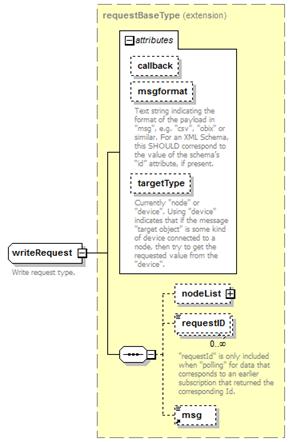
Diagram for complexType writeRequest
namespace |
omi.xsd |
type |
extension of requestBaseType |
properties |
base: requestBaseType |
children |
nodeList requestID msg |
used by |
element: omiEnvelope/write |
annotation |
documentation: Write request type. |
simpleType schemaID
namespace |
omi.xsd |
type |
xs:string |
properties |
base: xs:string |
used by |
attributes: requestBaseType/@msgformat |
annotation |
documentation: Some “predefined” identifier for the format/semantics of “value”; e.g., “csv”, “obix.xsd”. |